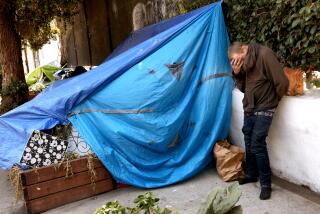Column: The mansionization of a Black church in Venice

The First Baptist Church of Venice is, honestly, not much to look at right now.
The soaring midcentury A-frame, with a stone veneer exterior that must have seemed very cool in the 1960s when it was built, was once an important strand in the fabric of life in Oakwood, the only part of coastal Los Angeles where Black people were historically allowed to buy property.
For several years now, the church has been empty. Its doors are boarded up, weeds choke the small lawn in front, and a makeshift banner hangs from the second story:
“Black Lives Matter? Give us back our Black church, Penskes!”
In few words, the sign conveys a world of conflict, where property rights, gentrification and the erasure of Black history are colliding and emotions are, understandably, running high.
The conflict over the property began in 2015, after its pastor had taken out loans against the church, then sold it and took his flock to a new church in Westchester. The move prompted a lawsuit in which he was found to have breached his fiduciary responsibility.
In 2017, Jay Penske, CEO of Penske Media, which owns, among other titles, Rolling Stone and Variety, and his wife, the former Victoria’s Secret model Elaine Irwin, purchased the church and its parking lot for $6.3 million. They spent another $5.5 million to buy a second church parking lot, across the street on Westminster Avenue.
The Penkses, neither of whom agreed to be quoted for this piece, want to build a massive private residence on the church site. On the lot across the street, they hope to build a multifamily rental structure that would include affordable units and spaces for artists.
Some neighbors were outraged that a millionaire publishing magnate would plop himself and his family down in the middle of Oakwood, a neighborhood of small lots that has, over the decades, changed first from a community of Black residents to a community divided equally among Black, Latino and white residents, and then to a predominantly white community, where oversized mini-mansions sit cheek by jowl with small homes on narrow streets.
When longtime Oakwood resident Naomi Nightingale heard about the Penskes’ plans, she told me, she was “astounded.”
“Why would these people who have more money than I can imagine, who could live anywhere they want in the world, why would they want to live here in the midst of Venice in what was predominantly a Black community?” she asked. “Why does this multimillionaire want to live in an area that was redlined for us, restrictive covenanted for us? Black folks could not live anywhere else. We were relegated to this place!”
I guess there are two answers to that question: Because they can. And because they thought they would be welcome.
Antoinette Reynolds, a church member who supported the sale, told me that the Penskes “didn’t steal the church. They didn’t bribe us to sell. If they have the money to buy the church, what does it matter what they build here?”
A person close to the project told me that the Penskes felt they were doing something positive. They talked with church members, held a gathering for neighbors and agreed, with the support of Los Angeles City Councilman Mike Bonin, to preserve the church’s midcentury modern exterior.
They believe they have saved the church from developers, who would simply raze the building and put up something new.
The project, which is pending before the California Coastal Commission, was supported by the Venice Neighborhood Council, city planners and many of the church‘s members. The Penskes paid to move the church’s furnishings to its new location.
Though I’m convinced the Penskes have behaved with the best of intentions, I also think they underestimated the message their purchase sent to a historically Black community that already feels itself disappearing under waves of money and white privilege.
::
In 2018, the Los Angeles Planning Department’s Cultural Heritage Commission determined that the First Baptist Church did not meet its criteria for designation as a historic cultural monument, saying the the church “has no particular historical or cultural significance to the city of Los Angeles.”
This was an affront to many Oakwood residents who grew up in and around the church.
“The church is a cultural monument,” Alma Collins said in the application presented to the commission. “It is the church I attended as a little girl. My mom, dad and grandmother attended that church. My father was a contractor and he built that church. Our culture and history is systematically being erased from our community and that is so wrong.”
Bonin thinks, given the current mood of the country, the ascendance of the Black Lives Matter movement and a new sensitivity to the erasure of Black culture, that it may be time to revisit the church’s historical importance.
“I think the city owes this a second look,” he told me last week. “I think the city — and I — owe it to the Black community in Venice to take another look and to try to help preserve what’s an important legacy.” It’s important to acknowledge, he added, that “all of our systems have racism baked into them, particularly land use, finance and housing.”
Mike Bravo, a fifth-generation Oakwood resident who opposes the Penskes’ project, is on the church’s front steps almost every Sunday, leading low-key protests and vigils that sometimes have the feel of teach-ins. Bravo and others hope the property could be restored and made into something that serves the community — a library, an African American museum, a garden or a school — “whatever can uplift the community,” he told me.
So far, no viable alternative to the Penskes’ project has been proposed, though some activists are trying to put together a nonprofit to raise funds.
I doubt very much Penske will abandon the project, but some are holding out hope.
“If Mr. Penske wants to be benevolent and make a philanthropic statement,” said Nightingale, “he could say, ‘OK, I am giving this back to the community, and what do I get?’ Maybe you get the community’s goodwill, and you would go down in history as a benefactor instead of destroyer.”
More to Read
A cure for the common opinion
Get thought-provoking perspectives with our weekly newsletter.
You may occasionally receive promotional content from the Los Angeles Times.











